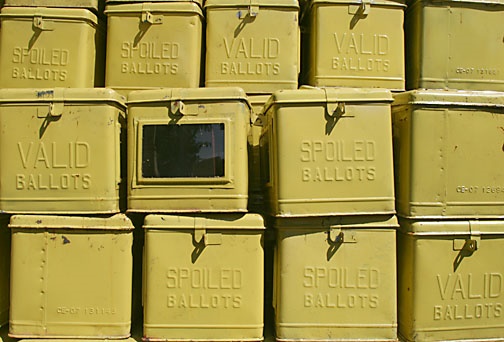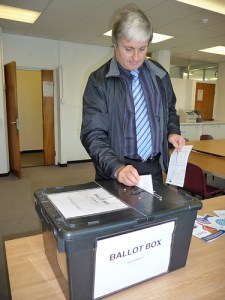In countries around the world, there have been major problems in the management of elections. Examples of failures of electoral management include:
- Queues at polling stations leaving citizens unable to vote
- Voting machinery causing a delayed count
- Errors in the electoral rolls
- Electoral officials not following processes
- Insufficent staff being appointed to run polling stations
The study of electoral management has long been overlooked, but unfortunately problems such as these have forced policy makers to take running elections seriously. Elections are not just conducted in a day. They are multi-year events, involving planning across a whole electoral cycle.
What is electoral management?
Electoral management can be defined as the ‘organisations, networks, resources, micro anthropological working practices and instruments involved in implementing elections.
Comparative Electoral Management

My new book on Comparative Electoral Management was published in 2020. Find out more information here.
The volume sets out:
- What is electoral management?
- How electoral management can be measured?
- Who is involved in running and managing elections?
- What works in improving the quality of elections?
Recent research findings
A variety of research projects have focused on:
- Surveying Electoral Management Bodies worldwide. This is a collaborative project with some excellent international colleagues – research findings will follow.
- Funding electoral services. In a recent publication we set out how public sector austerity can affect the management of elections.
- New challenges in electoral management. The twenty-first century has brought about many new challenges to emerge in many established democracies that make running elections more difficult for electoral administrators (see: this paper).
- The impact of performance standards. Introducing performance standards can improve the quality of electoral management (see: this paper)
- Centralising electoral management. Greater central control electoral management can lead to some unforeseen negative consequences (and yet also some positive ones) (see: this paper).
- Individual electoral registration. Implementing major changes, such as those to voter registration, can lead to many unintended consequences on other aspects of electoral management (see: this paper).
- UK Poll Worker Survey 2015. With Dr. Alistair Clark (University of Newcastle) which will involve the first ever survey of poll workers in the UK. This is funded by the British Academy and Leverhulme Trust.
- The quality of electoral management at the UK Brexit referendum. In a recent report funded by the Electoral Commission, Alistair Clark and I assess the UK’s electoral machinery.
Policy Impact on Electoral Electoral Management
Researchers have a duty, I think, to try to encourage policy makers to use their research to improve how elections are run. You can find out more about the policy impact that the research has had in this video, filmed by the ESRC, as part of their impact awards series:
Key Publications on Electoral Management:
- (2023) ‘Electoral Administration and the Problem of Poll Worker Recruitment: Who Volunteers, and Why?” Public Policy and Administration, with Alistair Clark, 38(2), p.188-208 .
- (2021) ‘Measuring electoral integrity: using practitioner knowledge to assess elections‘, Journal of Election, Public Opinion and Parties, with Holly Ann Garnett, 31(3), p. 348-367.
- (2021) ‘New Development: Running elections during a pandemic‘ Public Money and Management, 41(1), p.65-8.
- (2020), Comparative Electoral Management: Performance, Networks and Instruments (Routledge: London and New York).
- (2020) ‘Cyber elections: the threats and opportunities of using technology for electoral integrity’, Election Law Journal, with Holly Ann Garnett, 19(2), p.111-126.
- (2020) ‘Delivering Electoral Integrity Under Pressure: Local Government, Electoral Administration and the 2016 EU Referendum in the UK‘, Local Government Studies, 47(2), 186-207, with Alistair Clark
- (2020) ‘Electoral integrity, voter fraud and voter ID in polling stations: lessons from English local elections‘, Policy Studies, 41 (2-3) p.190-209 with Alistair Clark, download pre-print.
- (2019) ‘Better Workers, Better Elections? Electoral Management Body Workforces Worldwide and Electoral Integrity‘, International Political Science Review, 40 (3) 370-390.
- (2019) ‘Electoral Management and the Organisational Determinants of Electoral Integrity‘, International Political Science Review, with Holly Ann Garnett, Leontine Loeber and Carolien van Ham, 40 (3) 295-312.
- (2019) ‘Better Workers, Better Elections? Electoral Management Body Workforces Worldwide and Electoral Integrity‘, International Political Science Review, 40 (3) 370-390.
- (2017) ‘The Effects of Centralising Electoral Management Board Design,’ Policy Studies, 38(2), pp.130-148, (pdf).
- (2017) ‘The cost of elections: The effects of public sector austerity on electoral integrity and voter engagement,’ Public Money and Management, volume 37(7), pp. 461-468 (pdf).
- (2015) ‘Using Performance Benchmark Standards to improve Electoral Management‘, in ACE Case Studies, Stockholm: International Idea.
- (2014) ‘The Spill-over and Displacement Effects of Implementing Election Administration Reforms: Introducing Individual Electoral Registration in Britain’, Parliamentary Affairs, first published online 25 June 2012.
- (2013) ‘Fixing U.K. Failures of Electoral Management’, Electoral Studies, 32(4), December 2013, p. 597–608
- (2014) ‘Electoral Management in Britain’ in Pippa Norris, Richard Frank and Ferran Matinez I Coma (eds) Advancing Electoral Integrity (New York: Oxford University Press).
Recent Consultancy / Policy Reports / Evidence
- (2023) ‘Response to the Welsh Government Consultation on the electoral administration and reform White Paper‘, 9th January 2023.
- (2022) ‘The Draft Strategy and Policy Statement for the Electoral Commission‘, evidence to the UK Parliament Levelling Up, Housing and Communities Committee Commons Select Committee, October 2022.
- (2022) Global Electoral Integrity Report 2019-21. Electoral Integrity Project: Norwich and Kingston.
- (2020) Building Better Elections: Results of the European Electoral Management Survey. University of East Anglia: Norwich.
- (2017) The Cost of Elections: Funding Electoral Services in England and Wales, ClearView Research: London, with Tyrone Jervier, June 2017.
- (2016) ‘An Evaluation of Electoral Administration at the EU Referendum,’ Electoral Commission, September 2016, with Alistair Clark.
- (2016) ‘Getting the missing millions back on the electoral register,’the All Party Parliamentary Group on Voter Registration, April 2016, with Bite the Ballot.
Recent Blog posts
- (2023) ‘The UK needs an electoral data revolution to boost turnout and democracy‘ LSE Politics and Policy Blog, 7th February 2023, with Paul Bernal.
- (2021) Boris Johnson plans to take control of the independent Electoral Commission in another assault on democratic institutions’ The Conversation, November 8 2021
- (2021) ‘Elections and Covid-19: How special voting arrangements were expanded in 2020’, International IDEA, Erik Asplund, Lars Heuver, Fakiha Ahmed, Bor Stevense, Sulemana Umar, Toby James, Alistair Clark and Peter Wolf, 25th February 2021.

